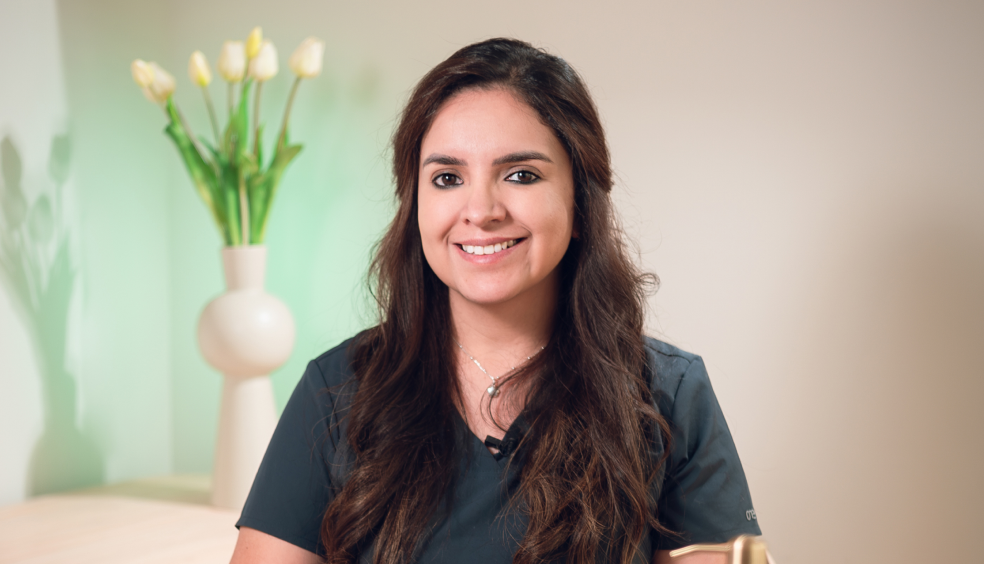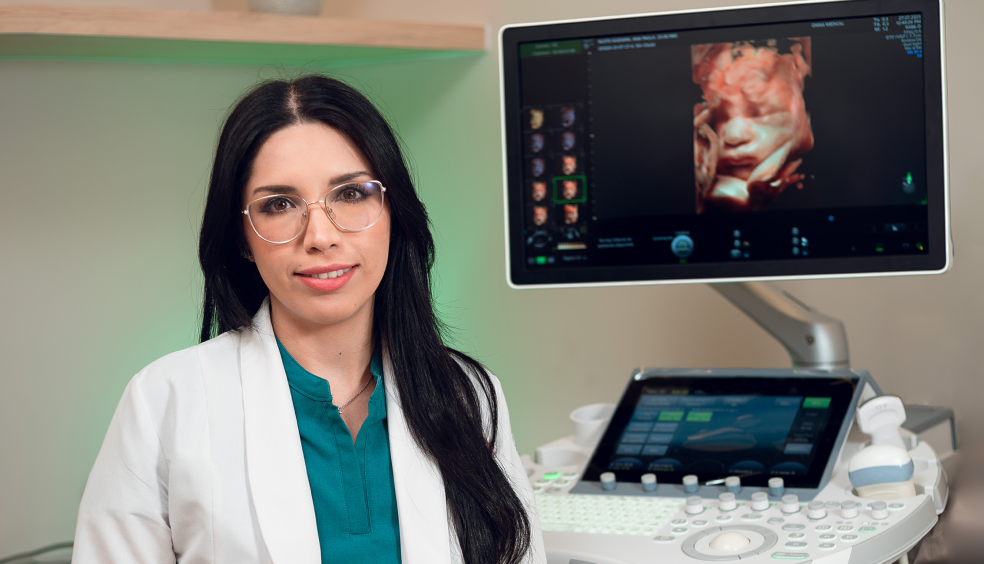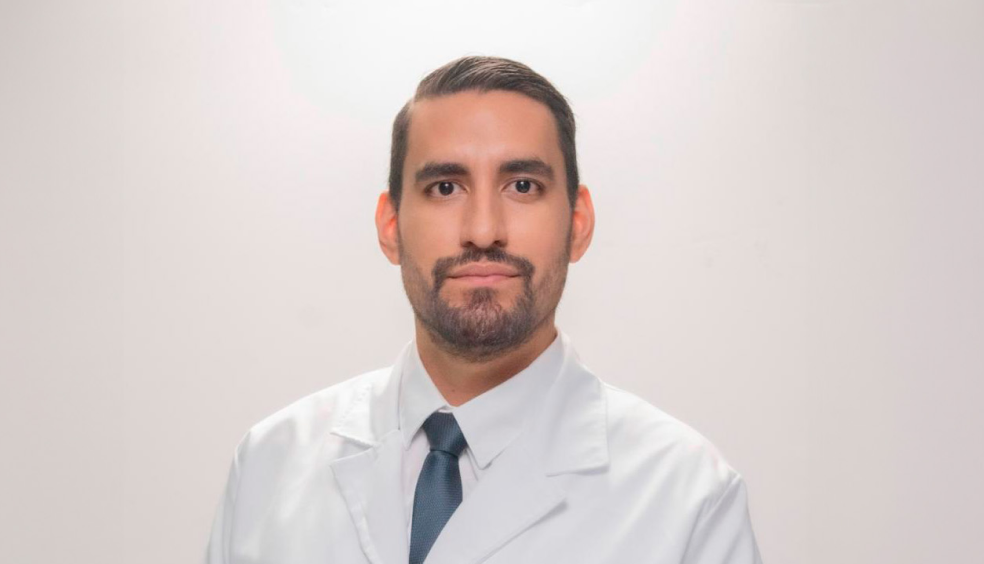Amniocentesis is a procedure to obtain a small sample of amniotic fluid to obtain genetic material from the baby.
Amniocentesis is a procedure we use to obtain a small sample of the amniotic fluid surrounding the fetus to obtain genetic material from the baby.
Amniocentesis is typically recommended for women over 35 years old and those who had abnormal values in their maternal serum screening, which could indicate the presence of a chromosomal abnormality or a neural tube defect.
It should be performed between weeks 15 and 20 of pregnancy.
Generally, we use a local anesthetic to numb the area of the abdomen where the needle will be inserted.
While every invasive procedure carries some risks, the risks associated with Amniocentesis are relatively low. The risk of fetal loss is around 0.1% to 1%, and the risk of membrane rupture is 1–2%. It’s important to know that complications are rare and you are in the hands of specialized medical professionals.
Through this procedure, we obtain a sample of amniotic fluid, which can be used for multiple genetic studies, as it contains cells and DNA from the baby.
Analyzing the environment it’s in, ruling out specific genomic mutations, open neural tube defects (ONTDs) like spina bifida, detecting intra-amniotic infections, or conducting paternity tests.
The amniotic fluid obtained through Amniocentesis helps us rule out, with 100% certainty, chromosomal abnormalities such as Down syndrome, Edwards syndrome, Turner syndrome, among others, and intra-amniotic infections.
During the procedure, we insert a fine needle through the abdomen to extract a small amount of amniotic fluid. At the same time, we perform an ultrasound to guide the specialist. This technology allows us to have a clear view of the baby and the placenta and to extract the amniotic fluid safely.
The procedure itself is quite quick, usually taking around 20 to 30 minutes.
Yes, it is an invasive method. A needle is carefully inserted into the uterus to extract the amniotic fluid. But you don’t need to worry, our maternal-fetal specialists have extensive experience in performing Amniocentesis, and the risk is practically nonexistent.
Results are usually available 12 to 15 days after the sample is taken. Once validated, we will send them to your email and to your doctor’s.

Gynecologist and Obstetrician with a subspecialty in Maternal Fetal Medicine and training in advanced fetal echocardiography.
Certified by the Mexican Council of Specialists in Gynecology and Obstetrics, and the Fetal Medicine Foundation. As an expert in maternal-fetal health, I try to convey to my patients the importance of care and supervision during pregnancy.

Gynecologist and Obstetrician with a subspecialty in Maternal-Fetal Medicine, certified by the Mexican Council of Specialists in Gynecology and Obstetrics and the Fetal Medicine Foundation.
Expert in the monitoring and management of high-risk pregnancies, detection of congenital disabilities, and twin pregnancies.

Gynecologist and Obstetrician with a subspecialty in Maternal Fetal Medicine by the UNAM. Experienced in the management of high risk obstetric and gynecologic pathology.
Certified by the Fetal Medicine Foundation in Cervical Assessment, Preeclampsia Detection and Doppler Ultrasound. Afiliado a la International Society for Prenatal Diagnosis y The Society for Maternal-Fetal Medicine. Affiliated to the International Society for Prenatal Diagnosis and The Society for Maternal-Fetal Medicine.

Specialist in Medical Genetics with subspecialty in Perinatal Genetics from the National Autonomous University of Mexico.
Certified by the Mexican Council of Human Genetics, she is an active member of the American Society of Human Genetics (ASHG), the International Society of Prenatal Diagnosis (ISPD) and the Mexican Association of Human Genetics (AMGH).
It is performed between the 11th and 14th week, and with it, we can know how many weeks of pregnancy you have and if there is a risk of Down Syndrome.
It is a blood test that detects two placental hormones; it improves the detection of Down Syndrome, Preeclampsia, and growth restriction.
During the second trimester, we carefully evaluate your baby's organs.
It provides information about the baby's growth, position, and the state of the placenta and amniotic fluid.
Our equipment offers images of greater clarity and resolution, which allows you to get to know your baby on a deeper level.
Allows for the evaluation of the baby's heart development and function, identifying possible heart anomalies and ensuring appropriate monitoring during pregnancy.
It consists of extracting amniotic fluid by means of an ultrasound-guided needle. It is performed after 15 weeks for the prenatal diagnosis of genetic disorders.
It is a procedure in which a small placenta sample is obtained under ultrasound control. It is performed between 10 and 14 weeks to diagnose genetic diseases.
It is a test that evaluates the behavior of your baby's heart and helps us determine if its oxygen supply is adequate.
It allows you to rule out chromosomal alterations in your baby, such as Down syndrome, using a blood sample from the mother.
Helps to relieve pain and discomfort caused by postural changes during pregnancy, improving lumbopelvic mobility, decreasing circulatory problems and maintaining pelvic floor muscle tone.
Improves musculoskeletal structures after pregnancy, provides lymphatic drainage and treatment for soft tissues and scars, facilitating a healthy and safe recovery.
Personalized nutrition plan to enhance chances of successful pregnancy. Custom strategies for couples diagnosed with infertility. Includes comprehensive assessment, tailored recommendations, and ongoing support.
Stage-specific nutritional strategies throughout pregnancy, with progress monitoring and customized recommendations based on each patient's individual needs.
Professional guidance for successful breastfeeding. Includes nursing techniques, solutions for common challenges, and nutritional recommendations during the lactation period.

Av. Paseo de la Reforma 2654, Quadrata Tower, 14th Floor, Office 1401, Lomas Altas, Miguel Hidalgo, CP 11950, Mexico City.
.
WhatsApp: +52 55 2248 8874
Manacar Shopping Center, Av. Insurgentes Centro 1457, Basement 1, Onna Unit, Mixcoac, Benito Juárez, CP 03920, Mexico City.
WhatsApp: +52 55 7473 7747